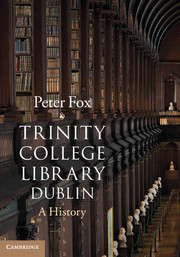Book contents
- Frontmatter
- Dedication
- Contents
- List of illustrations
- List of tables
- Acknowledgements
- Abbreviations
- Introduction
- 1 Early days: 1592–1640
- 2 Ussher, Kells and Durrow: 1641–1665
- 3 Alexander, Bath and the Jacobites: 1666–1708
- 4 A new building: 1709–1737
- 5 Stearne, Gilbert and Lyon: 1738–1749
- 6 The Library in 1750
- 7 Leland to Barrett: 1751–1800
- 8 Fagel: 1798–1809
- 9 Barrett: 1801–1821
- 10 Sadleir, Wall and Todd: 1822–1851
- 11 The Library in 1850
- 12 Todd as Librarian: 1852–1869
- 13 Malet and Ingram: 1869–1886
- 14 Abbott: 1887–1913
- 15 Smyly: 1914–1948
- 16 The Library in 1950
- 17 Parke: 1949–1965
- 18 Professional management: 1965–1983
- 19 Epilogue: 1984–2003
- Appendix 1 Librarians, Assistant Librarians and Deputy Librarians1
- Appendix 2 Growth of the collection
- Appendix 3 The Library oath and declaration
- Sources and select bibliography
- Index of Trinity College Dublin manuscripts
- General index
- Plate Section
- References
3 - Alexander, Bath and the Jacobites: 1666–1708
Published online by Cambridge University Press: 05 June 2014
- Frontmatter
- Dedication
- Contents
- List of illustrations
- List of tables
- Acknowledgements
- Abbreviations
- Introduction
- 1 Early days: 1592–1640
- 2 Ussher, Kells and Durrow: 1641–1665
- 3 Alexander, Bath and the Jacobites: 1666–1708
- 4 A new building: 1709–1737
- 5 Stearne, Gilbert and Lyon: 1738–1749
- 6 The Library in 1750
- 7 Leland to Barrett: 1751–1800
- 8 Fagel: 1798–1809
- 9 Barrett: 1801–1821
- 10 Sadleir, Wall and Todd: 1822–1851
- 11 The Library in 1850
- 12 Todd as Librarian: 1852–1869
- 13 Malet and Ingram: 1869–1886
- 14 Abbott: 1887–1913
- 15 Smyly: 1914–1948
- 16 The Library in 1950
- 17 Parke: 1949–1965
- 18 Professional management: 1965–1983
- 19 Epilogue: 1984–2003
- Appendix 1 Librarians, Assistant Librarians and Deputy Librarians1
- Appendix 2 Growth of the collection
- Appendix 3 The Library oath and declaration
- Sources and select bibliography
- Index of Trinity College Dublin manuscripts
- General index
- Plate Section
- References
Summary
Sir Jerome Alexander's library
Jerome Alexander was born in Norfolk and, after graduating from Cambridge, was called to the English bar. His career was for the most part a scandalous one, involving no less than four periods of imprisonment on charges including the forging of legal documents, intimidation of witnesses and misappropriation of funds. Forbidden to practise in England, he moved to Ireland, where he continued his legal career whilst, at the same time, proceeding to acquire forfeited lands in various parts of the country. He was knighted by Charles II and appointed as second Justice of Common Pleas in Ireland, in which office he was renowned for his harsh judgments and for the unscrupulous manner with which he managed to secure property to which he had no claim. He died in 1670, leaving the bulk of his considerable fortune to his youngest surviving daughter, on condition that she did not marry an Irishman or a Catholic, in which case her inheritance would transfer to Trinity. She duly married an English baronet, but Trinity benefitted considerably from other provisions in Alexander's will. He left the College his library of over six hundred books and manuscripts, apart from those on medical subjects, which went to his daughter. Over half the collection consisted of legal and statutory material, but it also covered politics and religion, geography and history, including 125 volumes of pamphlets published during the English Civil War.
In making his gift to the College, Alexander took pains to ensure that it adequately commemorated him as benefactor. He laid down strict instructions about how the transfer was to be handled and how the collection was to be administered. He specified that the books were not to be moved to Trinity until they had been catalogued, a task for which two people were to be appointed, one by his daughter and the other by the Provost. He left £500 to erect a new building for the College and a further £100 to house his library and provide accommodation for a Library Keeper, whose salary was to be met from part of the rent received from lands in County Westmeath, which he also gave to Trinity. The Library Keeper was to be appointed by the Provost and Fellows at a special meeting to be held on Christmas Day whenever a new incumbent was required.
- Type
- Chapter
- Information
- Trinity College Library DublinA History, pp. 34 - 50Publisher: Cambridge University PressPrint publication year: 2014



